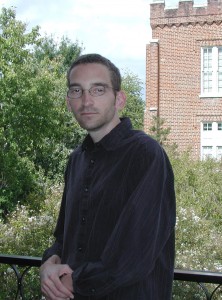
TUSCALOOSA, Ala. – University of Alabama doctoral student Ed Geisweidt, in the department of English, is one of only 14 graduate students in the country to be selected to participate in the Folger Institute’s year-long Dissertation Seminar, “Researching the Archives,” at the Folger Shakespeare Library in Washington, D.C.
Geisweidt’s selection coincides with UA’s new membership into the Folger consortium of universities which consists of 43 colleges and universities in the United States and abroad.
Universities in the Folger consortium help fund colloquia, seminars and other scholarly programs at the Folger Institute. Membership fees also allow consortium associates to travel to the Folger to attend seminars. The Folger Institute, a center for advanced study and research in the humanities, was founded in 1970 through a collaboration of the Folger Shakespeare Library and two Washington-area universities.
Geisweidt, who serves as assistant to the director for The Hudson Strode Program in Renaissance Studies in the College’s department of English, is the only student who is not attending a school in the Northeast to be selected for the program. Other Folger graduate researchers were selected from universities that include Penn
State , Princeton, Columbia , Brown and Rutgers .
Geisweidt will be funded to fly to Washington eight times during the academic year for two-day research visits. At the Folger Shakespeare Library, located on Capitol Hill, Geisweidt will have access to the world’s largest and highest quality collection of Shakespeare resources and other rare Renaissance books, manuscripts and art.
Geisweidt is using the library archives to conduct research for his dissertation, “The Cultural Coding of Hair in Early Modern England,” in which he looks at cultural beliefs and practices surrounding hair.
“There are lots of books just on hair and beliefs and practices surrounding it from that time period,” Geisweidt said. “For instance, they thought that redheads were treacherous. And there was the belief that if men trimmed their beards, it would help them feel better.”
Geisweidt is also studying animal hair as part of his dissertation.
“Some believed that if you left horsehair in water overnight, it would become a serpent the next day,” Geisweidt said.
Geisweidt said that many of early modern English beliefs and practices dated back to the Greeks and Romans more than 1,000 years ago. The popularity of these practices and how they affected that English society are an ongoing part of his research.
Geisweidt’s study completes a circle begun about 10 years ago when he was an undergraduate at Washington College in Chestertown, Md. He had participated in a summer internship program at the Folger Institute and worked at two conferences, one of which was led by Dr. Michael Mendle, chair of the College’s department of history and UA’s faculty representative to the Folger Institute’s central executive committee.
Dr. Sharon O’Dair, director of the Hudson Strode Program and Geisweidt’s dissertation director, said she and Mendle had discussed his possible candidacy for the prestigious Folger research program after they learned that UA had become a member of the Folger consortium.
Geisweidt hopes to complete his dissertation by the fall of 2008.
The College’s Hudson Strode Program is the only privately endowed program in English Renaissance Literature in the United States . It is named after the late Hudson Strode, notable author and teacher of Shakespeare and creative writing who taught at UA from 1916 to 1963.
The Folger Shakespeare Library opened in 1932 as a gift to America from Henry Clay Folger and his wife, Emily Jordan Folger. The Folger sponsors scholarly activities for students and teachers from kindergarten to the collegiate level. The Folger also produces the New Folger Library Shakespeare editions, Shakespeare Quarterly , and award-winning exhibition catalogs. It is funded through an endowment from the Andrew W. Mellon Foundation, grants from the National Endowment for the Humanities, and additional support from other sources.
UA’s English department is part of the College of Arts and Sciences, Alabama ’s largest liberal arts college and the University’s largest division with 360 faculty and 7,600 students.
Contact
Carmen Brown, College of Arts and Sciences, College Relations, 205/348-8539, brown109@bama.ua.edu